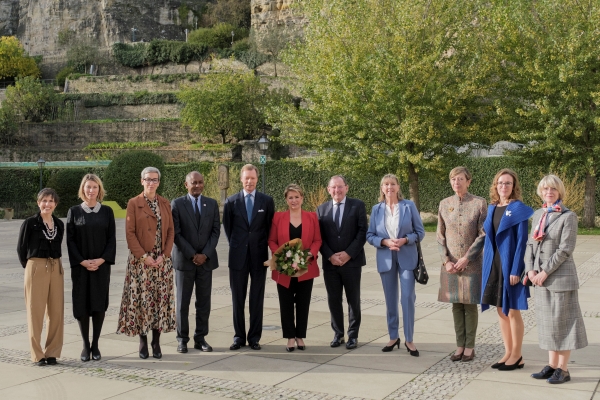 Credit: Neumünster / Studion Photography
Credit: Neumünster / Studion Photography
On Thursday 27 October 2022, a ceremony was organised in Neumünster on the occasion of the 75th anniversary of the Grand Duchy of Luxembourg's accession to UNESCO, in the presence of Their Royal Highnesses the Grand Duke and the Grand Duchess, UNESCO Goodwill Ambassador for 25 years.
The ceremony was also attended by Luxembourg's Minister of Culture, Sam Tanson, the Deputy Director General for Priority Africa and External Relations of UNESCO, Firmin Edouard Matoko, the Ambassador and Permanent Delegate of Luxembourg to UNESCO, Nadia Ernzer, and the President of the Luxembourg Commission for UNESCO, Simone Beck, amongst others.
In the immediate post-war period, UNESCO – the United Nations Educational, Scientific and Cultural Organization – was created on 16 November 1945. The ministers of education of the governments in exile in London as early as 1942 reflected on the concept of an organisation that could corroborate the intellectual and moral solidarity of humanity. On 27 October 1947, Luxembourg joined as the 33rd member country.
Since Luxembourg joined in 1947, many memorable moments for the Grand Duchy are worth mentioning. Thus, in 1994, the City of Luxembourg with its old quarters and its fortifications was included in the prestigious World Heritage programme which thus recognised its exceptional universal value. Since 2003, The Family of Man collection, made up of 503 photographs by 273 authors from 68 countries brought together by Edward Steichen for the Museum of Modern Art in New York (MoMA), has been part of the documents registered in the register of the Memory of the world, the documentary heritage of UNESCO. In 2010, the dancing procession of Echternach was inscribed on the Representative List of the Intangible Cultural Heritage of Humanity, joined in 2020 by the musical art of trumpet ringers, represented in Luxembourg by the Haupeschbléiser. In 2020, UNESCO granted the biosphere reserve label to the “Minett Unesco Biosphere”, made up of the eleven municipalities of the PRO-SUD intermunicipal syndicate within the framework of the MAB “Man and the Biosphere” programme. And in 2022 the Natur- & Geopark Mëllerdall became a Unesco Global Geopark. To date, thirteen schools have joined the UNESCO Associated Schools network, including recently the Lycée Michel Rodange and the Bonnevoie-Gellé primary school. The University of Luxembourg hosts a UNESCO Chair in Human Rights.
The 75th anniversary is an opportunity to celebrate a United Nations organisation which throughout its history has been able to offer programmes which are still very relevant today. Global citizenship, respect for others and for nature, solidarity and peace are values that are not always easy to implement on a day-to-day basis. Nevertheless, through its designations and its sites, UNESCO seeks to facilitate sustainable development and encourage a better way of living together.
More information on Luxembourg's role in UNESCO is available online via: www.unesco.public.lu.








